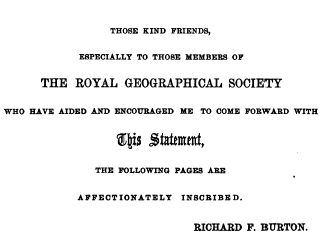 The Nile Basin
The Nile Basin
Part I. Showing Tanganyika to be Ptolemy's Western Lake Reservoir. A Memoir read before the Royal Geographic Society, November 14,1864. With Prefatory Remarks, by Richard Francis Burton.
Part II. Captain Speke's Discovery of the Source of the Nile. A Review. By James M' Queen.
First edition of 1864.
Tinsley Brothers: London.
PDF Page images.
ADVERTISEMENT.
THE reader is respectfully requested to observe that I have Five main Objections to the present "settlement" of the Nile question by deriving the great river from the supposed " Victoria Nyanza Lake:"
There is a difference of levels in the upper and the lower part of the so-called Lake. This point is important only when taken in connection with the following.
The native report that the Mwerango River is from the hills in the centre of the so-called Lake.
The general native belief that there is a road through the so-called Lake.
The fact that the southern part of the so-called Lake floods the country for thirteen miles, whereas the low and marshy northern shore is not inundated.
The phenomenon that the so-called Lake swells during the dry period of the Nile, and vice versa.
RICHARD F. BURTON.
CHURCHILL HOUSE, DAVENTRY,
Nov. 21, 1864.
...
The melancholy event of September 15th, 1864, which cast a gloom over our meetings at the pleasant "Bath Association," precludes the possibility of my entering into any questions of a private or a personal nature. It would, of course, have been far more congenial to my feelings to have met Captain Speke upon the platform, and to have argued out the affair before the scientific body then assembled. I went down fairly to seek this contest on September 13th. The day for the discussion was appointed for September 16th. Some hundreds of persons were assembled in the rooms of Section E, and when I appeared there it was only to hear that my quondam friend and Nile rival had on the previous afternoon lost his life by the merest accident. I had seen him at 13.0 P.M. ; at 4 P.M. he was a corpse During the first shock caused by this most painful announcement I could not command myself to speak on the subject. Being now about to leave Europe for some years, during which the Nile question will have greatly changed its present aspect, I cannot, in justice to the public, as well as to myself, allow errors--of late almost generally received--to make further way. This is the object of the present volume. At the same time, be it distinctly understood that, whilst differing from Captain Speke upon almost every geographical subject supposed to be "settled" by his exploration of 1860-63, I do not stand forth as an enemy of the departed ; that no man can better appreciate the noble qualities of energy, courage, and perseverance which he so eminently possessed than I do, who knew him for so many years, and who travelled with him as a brother, until the unfortunate rivalry respecting the Nile Sources arose like the ghost of discord between us, and was fanned to a flame by the enmity and the ambition of "friends."
